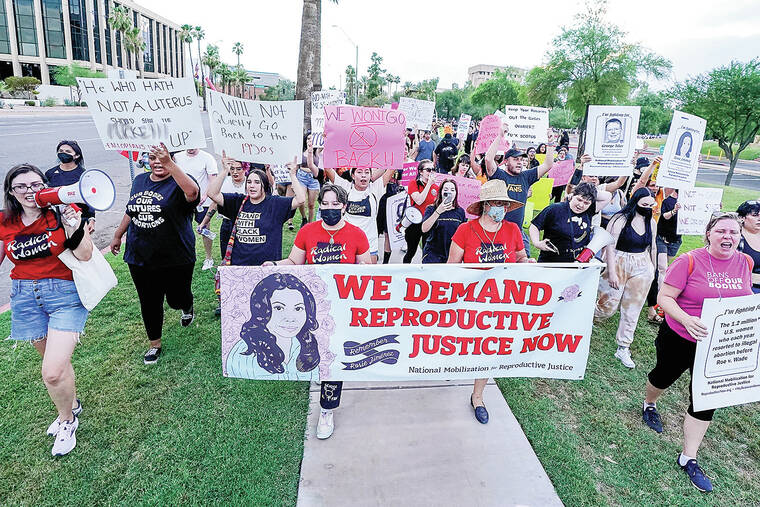Arizona just revived an 1864 law criminalizing abortion. Here’s what’s happening in other states
Developments this week in Arizona underscored something that was already apparent about the 2024 elections in the United States: Abortion is going to loom large as an issue in state and federal elections — including the presidential race — and directly in the form of referendums in some states.
An Arizona Supreme Court ruling that allows enforcement of a ban on abortion at all stages of pregnancy was part of a flurry of recent activity on the issue that has been in flux since the U.S. Supreme Court overturned Roe v. Wade and undid a national right to abortion in 2022.
At the moment, 14 states are enforcing bans on abortion at all stages of pregnancy, and two have them currently in place after about six weeks of pregnancy, before many women realize they are pregnant. Both numbers will rise within weeks because of recent court rulings, barring any surprise legislative or court action.
Most Democratic states have adopted executive orders, laws — or both — intended to protect abortion access. Lawmakers in Maine on Friday became the latest to give final passage to a “shield” legislation that would protect providers of both abortion and gender-affirming care from investigations by authorities in states with bans on them.
Here are things to know about the latest developments.
Enforcement to begin soon on Ariz.’s strict ban
The Arizona Supreme Court settled a confounding abortion policy question in the state this week, ruling that enforcement can begin soon on a ban adopted in 1864 on abortion at all stages of pregnancy with exceptions only to safe the life of the mother.
The decision overturns an appeals court ruling that found the prevailing abortion law was one from 2022 that allowed abortion during the first 15 weeks of pregnancy.
Now, there’s a question about whether the stricter ban kicks in this month or in June. Whenever it does, it’s expected to send women scrambling to neighboring states for abortion care.
The fallout from the ruling was swift.
The governor in the battleground state, a Democrat, called on the Republican-controlled legislature to repeal the nearly total ban. But GOP lawmakers blocked discussion of it.
Arizona voters could get a direct say in the matter; Maine voters will not
Arizona’s Supreme Court has spoken and GOP legislative leaders so far are reluctant to revisit the state’s abortion policy.
But voters could have a direct say in November.
Arizona is one of several states this year with a movement to ask voters to approve a constitutional amendment to protect abortion rights. Organizers say they’ve already exceeded the required 383,923 signatures, even though they’re not due until July 3. Even having enough valid signatures might not ensure it appears on the ballot; there are often legal challenges to ballot questions.
Ballot questions are approved already for three states: Maryland and New York, where there is broad access already; and Florida, a state in a situation similar to Arizona’s. In a ruling earlier this month, the Florida Supreme Court cleared the way for a ban on abortions to be banned there after the first six weeks of pregnancy, with limited exceptions. A court ruling allowing the ballot question was handed down the same day as the one allowing enforcement of the abortion ban to start on May 1. Ballot measures to protect or expand abortion access could appear this year in Arkansas, Montana, Nebraska, Nevada and South Dakota. In Colorado and Missouri, there are competing proposed measures to both protect and restrict access.
This week, Maine lawmakers all but ensured an amendment to enshrine abortion right into the state constitution will not go before voters there this year.
Presidential candidates weigh in
President Joe Biden and other Democrats have established abortion access as a key part of their campaigns this year.
It’s only becoming more intense with a ban set to take effect in Arizona, where Biden defeated former President Donald Trump by just 10,000 votes out of nearly 3.4 million cast when they faced off in 2020.
The day of the Arizona ruling, Biden launched an ad campaign in Arizona blaming Trump, the presumptive GOP presidential nominee, for clearing the way to the decision by appointing U.S. Supreme Court justices who overturned Roe v. Wade in 2022, ending a nationwide right to abortion and setting off state-by-state fights. Vice President Kamala Harris was headed to Arizona on Friday to address the topic, too. For his part, Trump has taken credit for the Supreme Court appointments.
Monday, Trump declined to endorse a federal ban, instead saying abortion should be up to the states.
After Tuesday’s ruling, Trump said the Arizona ruling will make the ban there go too far. “It’ll be straightened out,” he said Wednesday “and I’m sure that the governor and everybody else are going to bring it back into reason and that’ll be taken care of.”
Courts elsewhere
Lawyers representing the state government in Iowa went before the state supreme court there Thursday asking that a ban on abortion once cardiac activity can be detected — around six weeks — be allowed to take effect.
The law took effect last year, but a lower-court judge put it on hold after just a few days, leaving abortion legal, for now, for the first 20 weeks of pregnancy.
It’s one of several states where lingering court cases could change the status quo of the law.
The issue is primarily in state courts because it revolves around state constitutional questions.
But the U.S. Supreme Court is scheduled to hear arguments April 24 on the limits of the state’s ban on abortion throughout pregnancy. Biden’s administration says hospitals that receive Medicare funds are required to provide emergency care, potentially including abortion.


